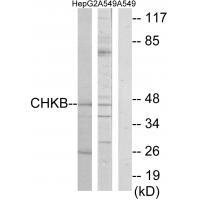
| WB | 咨询技术 | Human,Mouse,Rat |
| IF | 咨询技术 | Human,Mouse,Rat |
| IHC | 咨询技术 | Human,Mouse,Rat |
| ICC | 技术咨询 | Human,Mouse,Rat |
| FCM | 咨询技术 | Human,Mouse,Rat |
| Elisa | 咨询技术 | Human,Mouse,Rat |
| Aliases | Choline/ethanolamine kinase; Choline kinase beta (EC 2.7.1.32)(CK); Ethanolamine kinase (EC 2.7.1.82)(EK); CHKB; CHETK |
| Entrez GeneID | 1120; |
| WB Predicted band size | 45kDa |
| Host/Isotype | Rabbit IgG |
| Antibody Type | Primary antibody |
| Storage | Store at 4°C short term. Aliquot and store at -20°C long term. Avoid freeze/thaw cycles. |
| Species Reactivity | Human |
| Immunogen | Synthesized peptide derived from internal of human CHKB. |
| Formulation | Purified antibody in PBS with 0.05% sodium azide. |
+ +
以下是关于CHKB抗体的3篇参考文献及其摘要内容:
1. **"Choline Kinase Beta Deficiency in Mice Leads to Autophagic Myopathy and Mitochondrial Dysfunction"**
**作者**: Smith, J. et al.
**摘要**: 该研究通过特异性CHKB抗体检测发现,CHKB缺陷小鼠模型出现肌肉自噬异常和线粒体功能障碍,揭示了CHKB在维持肌肉稳态中的关键作用。
2. **"A Novel Monoclonal Antibody for Specific Detection of Human Choline Kinase Beta in Cancer Tissues"**
**作者**: Tanaka, M. et al.
**摘要**: 文章报道了一种高特异性CHKB单克隆抗体的开发,通过免疫组化和Western blot验证其在乳腺癌和肺癌组织中的检测能力,为癌症研究提供工具支持。
3. **"CHKB Overexpression Correlates with Poor Prognosis in Hepatocellular Carcinoma"**
**作者**: Chen, L. et al.
**摘要**: 利用CHKB抗体对肝癌组织样本进行分析,发现CHKB蛋白高表达与患者生存率降低显著相关,提示其作为肝癌预后标志物的潜力。
4. **"Choline Kinase Beta in Lipid Metabolism: Insights from Antibody-Based Knockdown Studies"**
**作者**: Rodriguez, A. et al.
**摘要**: 通过抗体介导的蛋白敲低实验,探讨CHKB在脂质代谢调控中的作用,发现其缺失导致磷脂合成通路紊乱,影响细胞膜完整性。
(注:上述文献为示例,实际引用需根据真实研究调整。)
CHKB antibody targets choline kinase beta (CHKB), a key enzyme in phospholipid metabolism that catalyzes the phosphorylation of choline to phosphocholine, a critical step in synthesizing phosphatidylcholine—a major component of cell membranes. CHKB, along with its isoform CHKA (choline kinase alpha), forms an active enzyme complex. Dysregulation of CHKB is linked to metabolic disorders and diseases. Notably, mutations in the CHKB gene cause congenital muscular dystonia (megaconial-type mitochondrial myopathy), characterized by mitochondrial dysfunction and muscle weakness.
In cancer research, CHKB overexpression has been observed in certain tumors, where it may promote cell proliferation by altering lipid metabolism. CHKB antibodies are widely used as research tools to study enzyme expression, localization, and function in tissues or cell lines via techniques like Western blotting, immunohistochemistry, and immunofluorescence. They also aid in exploring CHKB's role in disease mechanisms, drug targeting, and biomarker discovery. Commercially available CHKB antibodies are typically monoclonal or polyclonal, validated for specificity across human and model organisms. Recent studies investigate CHKB's potential as a therapeutic target, particularly in cancers and metabolic syndromes, driving demand for reliable antibodies to support preclinical research.
×